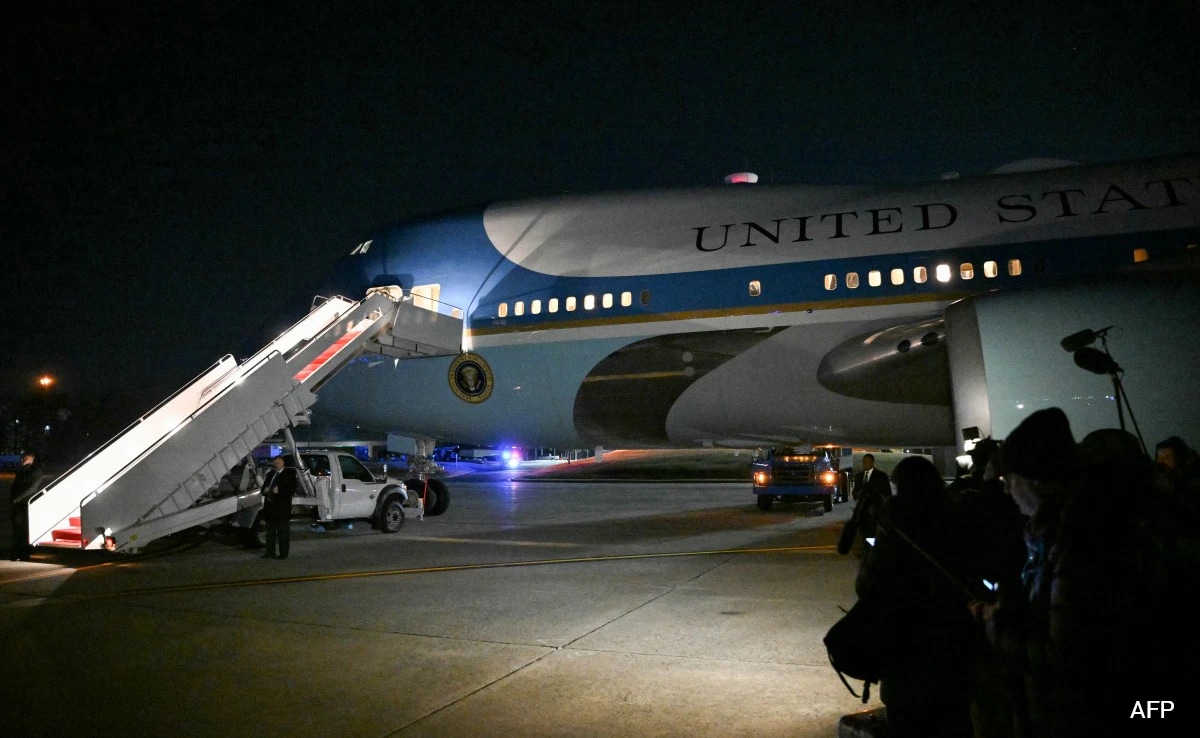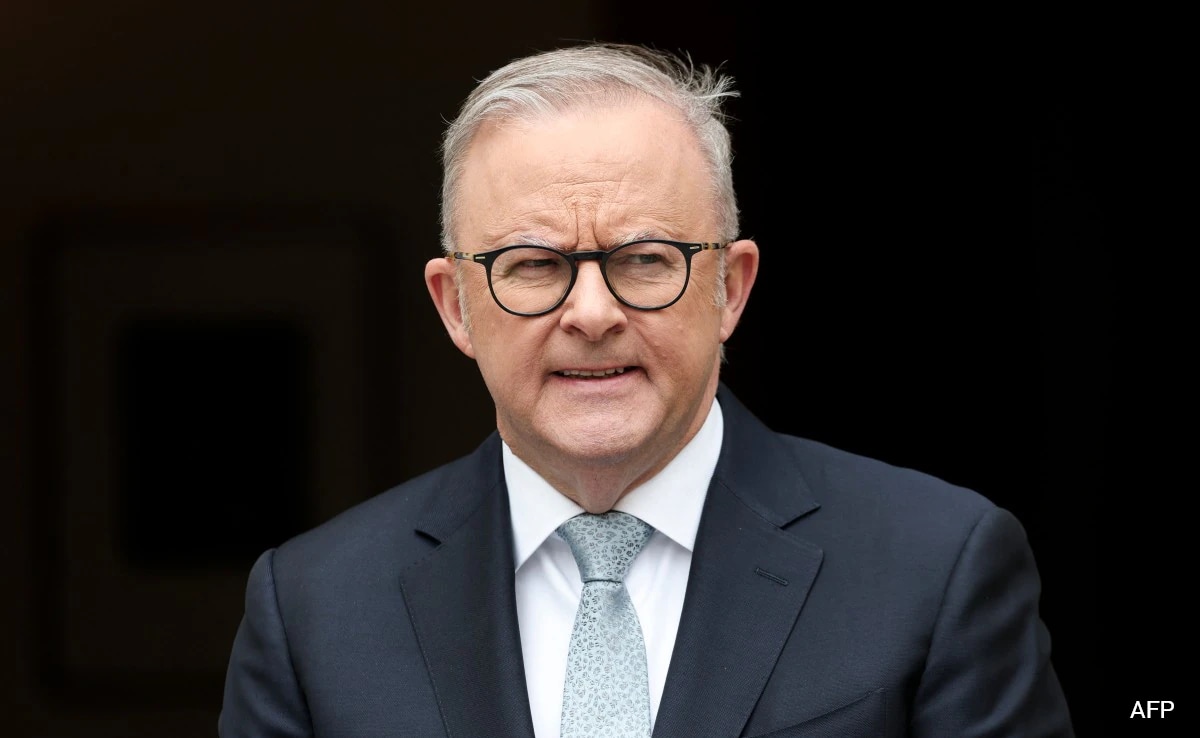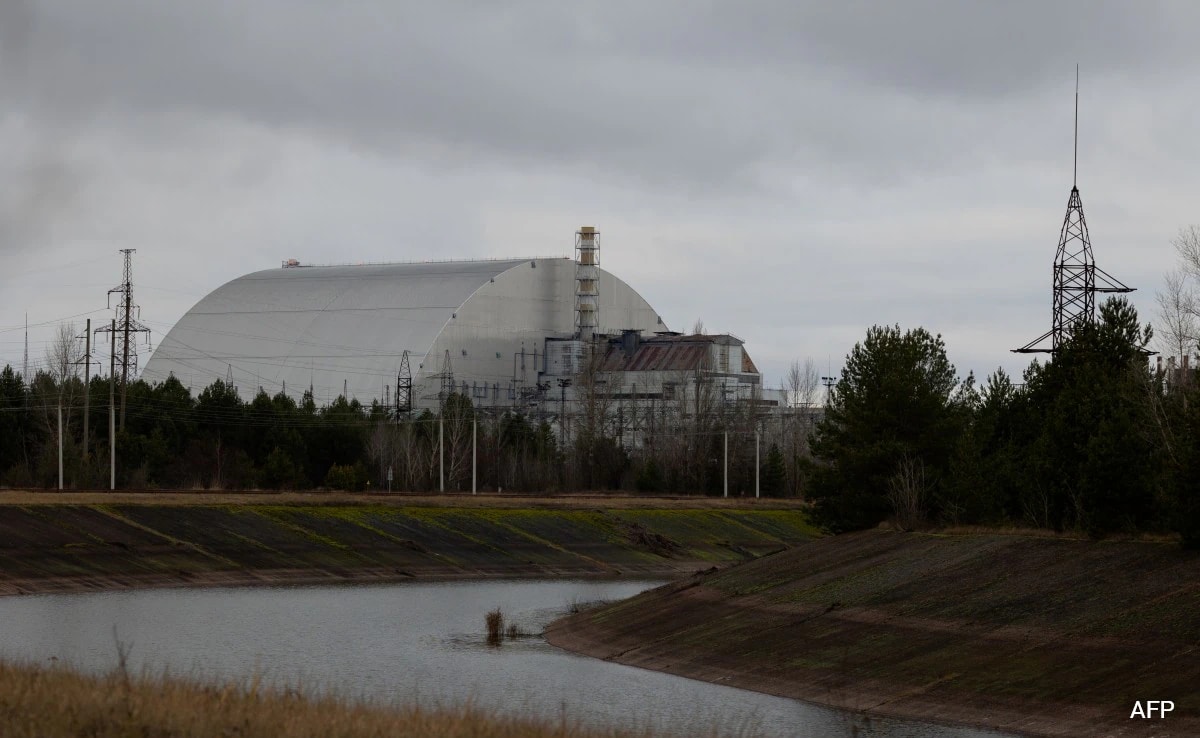Moscowâs troops have pushed into the Black Sea port city of Kherson â where Russian state media said Kremlin forces had taken control, but Ukrainian defense officials were adamant that the fight rages on. Russian troops filled the streets and stormed into the city council building, according to the mayor, but âthe flag above us is Ukrainian,â he wrote on Facebook.
The Ukrainian response, bolstered by scrappy civilian militias, continues to slow its opponentâs advance. After days of heavy shelling, Ukraine has defied the odds to hold cities under fire, including Kharkiv, Chernihiv and Mariupol, according to the British Defense Ministry â as the Russian convoy rumbling toward Kyiv struggles with low morale and botched planning. Ukrainian President Volodymyr Zelensky was defiant on Thursday: âSo many times they wanted to destroy us. But they couldnât. Wanted to wipe us from the face of the earth. But werenât successful. Beat our backs. But we are standing on our feet.â
Just over 1 million people have fled Ukraine since the Russian invasion began, according to data from the U.N. refugee agency â an exodus that is set to become Europeâs worst humanitarian crisis this century. That figure already matches the number of refugees who were displaced from Syria, Iraq and Afghanistan in 2015. The International Criminal Court has opened an investigation into possible war crimes in Ukraine, the intergovernmental organizationâs prosecutor said in a statement.
Hereâs what to know
Newsâ¢
Newsâ¢
Newsâ¢
Russiaâs liberal icon Echo of Moscow may be doomed, after new move to stop it reporting on Ukraine invasion
Return to menuMOSCOW â Russiaâs Echo of Moscow radio station, an emblem of liberalism in the country for more than three decades, will be liquidated, underscoring how swiftly authorities are crushing the few media voices reporting the reality of the war against Ukraine.
The stationâs board, controlled by giant state gas monopoly Gazprom, voted to abolish the station Thursday. It had already been taken off the air on the orders of Russiaâs prosecutor general Tuesday but continued to operate on YouTube and online.
Thursdayâs move goes much further and threatens the stationâs ability to continue operating. A number of its hosts and commentators are among Russiaâs most prominent critics of President Vladimir Putin.
As one of the few independent media voices remaining in Russia, it was vulnerable because of its 66 percent majority control by Gazprom, a company accused by critics of acting as a lever of Kremlin geopolitical power, claims it denies.
While the boardâs decision to liquidate the station threatens its funding and budget, Echo of Moscow director Alexei Venediktov said Thursday it was too early to know the full implications. Russiaâs communications regulator also demanded that Google remove the Echo of Moscow app from its store, according to the station.
Russian authorities have banned media outlets from calling the military operation against Ukraine a war, invasion or attacks and have criminalized journalism that contradicts the official government line. But Echo of Moscow continues to report on the shelling of civilian neighborhoods, even as Russiaâs Defense Ministry insists that it âtakes measures to ensure the safety of the civilian population of Ukraine.â
Most journalists from another independent outlet, Dozhd television, which was also blocked by authorities Tuesday, have left the country, according to founder Tikhon Dzyadko, announcing Wednesday that he had fled for his safety.
Russia throttles social media connections, silences news outlets over invasion coverage
Return to menuAs Russian troops continue to bombard major Ukrainian cities, Moscow is also stepping up pressure on social media sites and news organizations at home. It has throttled the publicâs access to information hubs like Twitter and Facebook and silenced reporting on the invasion by shutting down news outlets.
Russiaâs communication and media regulator Roskomnadzor has slowed online traffic to Facebook, according to an agency announcement last Friday, after the social media giant accused the social media platformâs parent company, Meta, of restricting the content on four state-affiliated news outlets.
Metaâs head of global affairs Nick Clegg responded in a statement pledging that the company will continue to independently fact-check and that it wants people in Russia âto continue to make their voices heard, share whatâs happening, and organize" via its suite of apps like Messenger, Instagram and WhatsApp.
Connectivity to Twitter has also been restricted for those who use services provided by four major telecommunications companies, internet monitoring group Netblocks said last Saturday. Like Meta and other tech giants, Twitter has said that it will restrict Russian state media content for users in the European Union.
Russiaâs rubber-stamp national legislature is meeting this Friday to discuss a bill that seeks to make âunofficialâ reporting on Russiaâs attack on Ukraine punishable by up to 15 years in prison. Two independent news broadcasters â Echo Moskvy radio station and Dozhd TV â were taken off the airwaves Tuesday.
The U.S. State Department said this round of crackdowns mounts to a âfull assault on media freedom and the truth" by Moscow authorities. âThe people of Russia ... have a right to know about the death, suffering and destruction being inflicted by their government on the people of Ukraine," the department spokesman Ned Price said in a statement Wednesday. âThe people of Russia also have a right to know about the human costs of this senseless war to their own soldiers.â
Russian convoy threatening Kyiv still over 18 miles away, U.K. says
Return to menuBritainâs Ministry of Defense said Thursday morning that the massive convoy of Russian troops and tanks looming over the Ukrainian capital remains more than 18 miles away from Kyivâs center. It said delays stemmed in part from âUkrainian resistance, mechanical breakdown and congestionsâ with the column having made âlittle discernible progress over three days.â
The line of armored vehicles, tanks and towed artillery had been wending its way closer to Kyiv, drawing within 20 miles of the city center on Monday, satellite images showed. The fleet stretched for some 40 miles, according to U.S. firm Maxar Technologies, which captured the photos Monday.
U.S. officials have since cautioned that while the fleet of combat vehicles may have been stalled, Moscow probably could bounce back from early setbacks, maintaining the upper hand against Ukraineâs outgunned military.
Ukraineâs second-largest city of Kharkiv, the northern city of Chernihiv and the port city of Mariupol, which have all come under fierce attack, remain in Ukrainian hands, according to the assessments from Britain, which defense analysts say has substantial intelligence capabilities in the region.
The British intelligence update also said Russian forces had entered Kherson, âbut the military situation remains unclear.â Moscow on Wednesday said it had captured the southern city, whose mayor said Russian forces entered the council building, though a Ukrainian defense official said that night that the battle for Kherson was still raging.
Latest Defence Intelligence update on the situation in Ukraine - 03 March 2022
Find out more about the UK government's response: https://t.co/94E5eEDqiw
ðºð¦ #StandWithUkraine ðºð¦ pic.twitter.com/XFTUykMhQx
Australia investigates suspicious package sent to Russian Embassy
Return to menuSYDNEY â Australian Federal Police are investigating a suspicious package delivered to the Russian Embassy in Canberra on Thursday. Images taken by bystanders and local media showed Australian authorities in hazmat suits entering a cordoned-off area in front of the embassy, located along a main avenue in the capital.
Police said they had looked at two packages, one of which they determined not to be suspicious, while the other required further analysis. Ilya Roshchenkov, a press secretary at the embassy, told The Washington Post that the package contained âsuspicious powderâ but declined to comment further.
In a statement, the embassy said it had been âmassively targeted lately with threatening and insulting messages and actionsâ and thanked the police for their âquick and professional response.â
Australia has joined the United States and other nations in imposing sanctions on Russia and earlier this week said it would send $50 million worth of lethal defensive weapons to Ukraine.
BBC launches shortwave radio frequencies, popular in wartime, to bring information to Ukraine and Russia
Return to menuThe British Broadcasting Corporation has launched two new shortwave radio frequencies that will reach areas of Ukraine and Russia where access to information may be limited because of Moscowâs invasion.
People in Kyiv and parts of Russia will be able to clearly hear BBC World Service news in English for four hours a day â from 4 to 6 p.m. British time on 15735 kHz and from 10 p.m. to midnight on 5875 kHz â a statement from the BBC said Wednesday.
Shortwave radio was invented in the early 1920s and became especially popular in Europe during times of conflict because it can reach remote areas and travel vast distances without the need for satellites or cables, which can be compromised in wartime. It tends to work better at night than during the daytime.
âWe will continue giving the Russian people access to the truth, however we can,â Tim Davie, director general of the BBC, said in a statement.
According to BBC figures, an increasing number of Ukrainians and Russians are consuming news from the British broadcaster, as the Kremlin has stepped up efforts to force Russian media outlets to espouse the official line on the conflict and after a Russian missile strike appeared to target a TV tower in Kyiv on Tuesday.
The number of readers of the English-language BBC site in Russia climbed to 423,000 last week, the broadcaster said, an increase of 252 percent, while in Ukraine, it was up by 154 percent. Meanwhile, its Russian- and Ukrainian-language news websites also saw their readership soar, with the Russian-language site reaching 10.7 million people in the past week, the BBC said.
âIn a conflict where disinformation and propaganda is rife, there is a clear need for factual and independent news people can trust,â Davie said, âand in a significant development, millions more Russians are turning to the BBC.â
Shortwave radio signals can travel for âmany thousands of miles,â or even around the globe, according to the U.S.-based National Association of Shortwave Broadcasters. âThe secret is the ionosphere â a layer of the earthâs atmosphere that shortwave signals bounce off of, rebounding back to earth hundreds and thousands of miles from their point of origin,â the nonprofit industry group says on its website.
The Ukrainian leader who is pushing Silicon Valley to stand up to Russia
Return to menuSix months ago, Mykhailo Fedorov, one of Ukraineâs deputy prime ministers, made a pilgrimage to Silicon Valley to discuss his countryâs digital transformation. On Facebook, he posted a photo of himself arm-in-arm with Apple CEO Tim Cook in Palo Alto, Calif., praising him as the âmost efficient manager in the world.â
On Tuesday, Fedorov had a less effusive message for Cook: Block App Store access in Russia.
âThey kill our children, now kill their access!â he tweeted, tagging Cook.
As Russian missiles rain down on Ukraine, Fedorov has launched his own pressure campaign, tweeting at some of the worldâs most powerful tech companies to take action to shut down Russian propaganda and disconnect Russia from the rest of the world. In the process, he has become the chief agitator of an industry that has long been reluctant to bend to political demands in any country or conflict, and heâs done it without enacting laws or using economic leverage.
According to his deputy minister, Alex Bornyakov, Fedorov has pressed about 50 companies for aid while his staff has worked behind the scenes with a network of Ukrainian expats and regulators from other countries to get the companies to act. And itâs working: Since Fedorov began tweeting after last weekâs Russian invasion, Facebook and YouTube have cracked down on Russian state media, and Google has disabled some features on Google Maps to protect the safety of Ukrainian citizens.
And after Fedorov tweeted at Cook, Apple said it would pause all product sales in Russia.
This city became a haven for people fleeing Kharkiv. But for how long?
Return to menuDNIPRO, Ukraine â The air-raid sirens in Anyaâs Kharkiv neighborhood didnât work. So the blasts from Russian shells came without warning. And then they got closer and louder. They didnât stop.
She and her parents huddled together in their apartment hallway, away from all windows, and stayed put.
For four days, a relentless Russian assault hammered the eastern Ukrainian city with attacks that included the suspected use of cluster munitions in civilian areas, including Anyaâs neighborhood. Finally on Monday, she planned an exit route.
Anya, an 18-year-old artist, packed clothing, her laptop and a sketch pad. She had to leave behind her ukulele and her parents, who evacuated on Wednesday. She and her girlfriend called around for a taxi for about an hour, offering the driver a bribe to take them to the train station despite the ongoing bombardment.
Anyaâs destination was Dnipro, a city about 120 miles southwest of Kharkiv that has yet to see any shelling.
Volunteers in Dnipro have readied schools, cultural centers, empty dormitories and an abandoned hotel as refuges for people fleeing Kharkiv and other nearby eastern Ukrainian cities under siege.
The city is considered safe for now. But Russian soldiers have already advanced on Zaporizhia, about 50 miles south, and could head to Dnipro next.
This is how journalists figure out if all those Ukraine videos are real
Return to menuAmid reports of fighting in Ukraine over the weekend, one video posted on social media captured an apocalyptic scene: multiple fires raging on a highway outside of an apartment building as smoke billowed and loud pops rang through the night.
It was gripping footage, but journalists who looked at it knew that many similar videos have turned out to not be what they seem: A clip of a supposed missile launch in Ukraine had actually been filmed in Turkey in 2016; an Instagram post purporting to show Russian planes over Kyiv actually depicted a Russian military flyover two years ago in Moscow.
The Washington Post only deemed the fire video worthy of publication after a âvisual forensicsâ team spent hours analyzing it and cross-referencing it with maps and other social media posts â eventually pinpointing the exact street corner in Kyiv where the inferno took place.
Newsrooms are increasingly relying on such teams to sort through a torrent of images emerging from the conflict, separating genuine videos from misinformation.
Unlike typical newsroom investigations that rely on private data to uncover stories and verify incidents, visual forensics uses open-source, widely available materials, such social media videos and photos, Google Maps, public databases and weather reports, or high-quality satellite images offered through paid subscriptions.
âThis is a very rigorous process,â said New York Times visual investigations reporter Haley Willis. âWe have similar verification standards as any other journalist. Very few journalists are going to write a story based on what one source is saying, unless it is the source. Weâre the same: we wait for multiple points of corroboration.â
.png)











 English (United States) ·
English (United States) ·  Turkish (Turkey) ·
Turkish (Turkey) ·